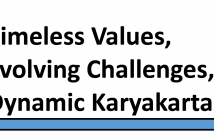Over 2000 people. More than 300 tents. Three days. Sanskaar, Sewa, and Sanghatan. Fifty years of Hindu Swayamsevak Sangh (UK) celebrated at Sanskriti Mahashibir.
These landmark three days are not the end of fifty years, but a crossroads. In the last half-century, Sangh has instilled universal family values to build characters who have the capacity and drive to go out into all walks of life and selflessly organise the wider community. How? In local shakhas (branches), physical activities such as yoga, games, talks, discussions are carried out. Each individual activity develops different qualities and values, such as discipline, respect, humility, selflessness, compassion, and appreciating the unity in diversity. Engaging in these activities on a weekly basis brings to the fore these sanskaars. They develop into good habits, which in turn develop into experience and eventually go on to build character.
“It is the coming together of little things in an organised manner that always goes to make a great thing. Great characters do not come up as ready-made products in a day. They are built silently, and their glorious heights scaled inch by inch and step by step.” – Pujaniya Guruji
During Sanskriti Mahashibir, I have come to realise that the key to this is the parivaar prabodhan, or family environment, that exists within Sangh. One of our geets says, “Shuddha saatvik prem apane, kaarya kaa aadhaar hai.” We eat together, live together, and learn together. The activities in local shakhas create close connections that transcend all boundaries. In order to develop the universal values that will go to make these great characters, we must treat all those around us, irrespective of their ethnicity, beliefs or other characteristics, as members of our own family. This applies not only to those within our own shakha, or within our town, but to anyone and everyone.
ayam nijah paro veti gananaa laghucetasaam, udaara caritaanaam tu vasudhaiva kutumbakam
– “The thought that this is mine and that is somebody else’s appears only to those with a narrow mind. For the open-minded, however, the entire world is one family.”
We must nevertheless ask ourselves, “What next?” How can we continue to do the work of the past fifty years in the next fifty? What can we do to overcome the new challenges that we will face? The role of the shakha is to produce karyakartas (workers) who will not only themselves go on to impact the world but who will create more karyakartas. In order to further develop our work, these karyakartas must have certain qualities. There must be samarpan, dedication to the work we do. There must be vairagya, detachment from the results of our work; our primary concern must be the efforts that we put in. There must be tyaag, sacrifice. The work must be done selflessly. The true karyakarta is compassionate; their motivation is the pain in others from which their action flows. It is vital that these qualities are not only demonstrated in a Sangh environment, but in all areas of life. In order to truly impact the world, these qualities must be applied in the wider world.
To that end, we must strive for the ultimate selflessness. We may develop ourselves along the way, but we cannot lose sight of our ultimate aim: ensuring that sanskaars are developed within others. We must work not for self-interest, not for fear, compulsion or ego, but for the work alone; and the worker and work must become one.
na tvaham kaamaye raajyam, na svargam naapunarbhavam, kaamaye duhkha taptaanaam, praaninaamaartinaasanam – “I do not desire for kingdom, heaven or end of rebirth. My only desire is that all those beings which are afflicted by misery be happy.”
Sanskriti Mahashibir is a crossroads. We have felt and celebrated the great impact of the last fifty years. Yet there is still work to be done. The circumstances which we face today are vastly different to the circumstances ten years ago, let alone twenty or fifty years in the past. So too will the circumstances of the future be different. If our work is to continue in the effective manner in which it thus far has done, we must not be afraid to innovate. Sanskriti Mahashibir is testament to this: tents, more extensive uses of technology and many more. We cannot afford to forsake our ultimate purpose for the sake of maintaining traditions and practices that are no longer best suited to imparting sanskaars and building characters in the modern day.
“We should give close attention to the programmes in shakhas, systems therein, swayamsevaks’ attitude, behaviour and development of good qualities. I believe that success shall be ours when all of us are involved in this effort with one mind.” – Pujaniya Guruji
This is only the beginning. We must continue to selflessly create a family environment in which we can instil universal values in whatever way is most appropriate at the time. In this way, we organise the society to create a spirit of oneness and a world in which we all walk side by side.
upkaarah paro dharmah, prayatno daivatam param, sushilataa paraa nitih, kaaryam samghaatmakam param – “Service is the greatest virtue. Effort is the highest fortune. Noble character is the ultimate wisdom and the greatest work is of the organisation of the society.”




